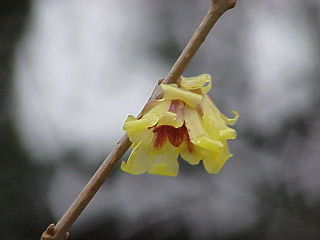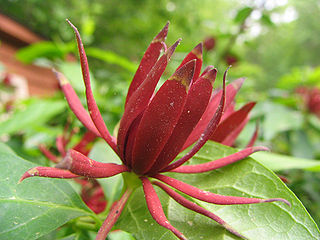
Jasmine is a genus of shrubs and vines in the olive family (Oleaceae). It contains around 200 species native to tropical and warm temperate regions of Eurasia, Australasia and Oceania. Jasmines are widely cultivated for the characteristic fragrance of their flowers. A number of unrelated plants contain the word "Jasmine" in their common names.
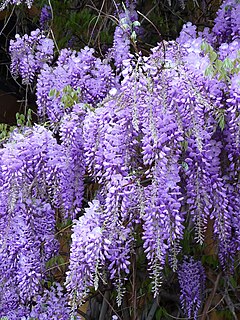
Wisteria is a genus of flowering plants in the legume family, Fabaceae (Leguminosae), that includes ten species of woody climbing bines that are native to China, Korea, and Japan and as an introduced species to the Eastern United States. Some species are popular ornamental plants. An aquatic flowering plant with the common name wisteria or 'water wisteria' is in fact Hygrophila difformis, in the family Acanthaceae.

Rosa rugosa is a species of rose native to eastern Asia, in northeastern China, Japan, Korea and southeastern Siberia, where it grows on the coast, often on sand dunes. It should not be confused with Rosa multiflora, which is also known as "Japanese rose". The Latin word "rugosa" means "wrinkled."

Lonicera japonica, known as Japanese honeysuckle and golden-and-silver honeysuckle, is a species of honeysuckle native to eastern Asia including China, Japan, and Korea. It is a twining vine able to climb up to 10 m (33 ft) high or more in trees, with opposite, simple oval leaves 3–8 cm (1.2–3.1 in) long and 2–3 cm (0.79–1.18 in) broad. The flowers are double-tongued, opening white and fading to yellow, and sweetly vanilla scented. The fruit is a black spherical berry 3–4 mm (0.12–0.16 in) diameter containing a few seeds.

Koelreuteria paniculata is a species of flowering plant in the family Sapindaceae, native to eastern Asia, in China and Korea. It was introduced in Europe 1747, and to America in 1763, and has become a popular landscape tree worldwide. Common names include goldenrain tree, pride of India, China tree, or varnish tree.

Paulownia tomentosa is a deciduous tree in the family Paulowniaceae, native to central and western China. It is an extremely fast-growing tree, and is a persistent exotic invasive in North America.
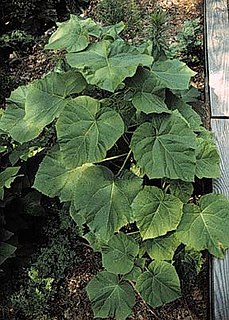
Paulownia is a genus of six to 17 species of flowering plants in the family Paulowniaceae, related to and sometimes included in the Scrophulariaceae. They are present in much of China, south to northern Laos and Vietnam and are long cultivated elsewhere in eastern Asia, notably in Japan and Korea. They are deciduous trees 12–15 m (39–49 ft) tall, with large, heart-shaped leaves 15–40 cm across, arranged in opposite pairs on the stem. The flowers are produced in early spring on panicles 10–30 cm long, with a tubular purple corolla resembling a foxglove flower. The fruit is a dry capsule, containing thousands of minute seeds.

Cotoneaster is a genus of flowering plants in the rose family, Rosaceae, native to the Palaearctic region, with a strong concentration of diversity in the genus in the mountains of southwestern China and the Himalayas. They are related to hawthorns (Crataegus), firethorns (Pyracantha), photinias (Photinia) and rowans (Sorbus).

Malva is a genus of about 25–30 species of herbaceous annual, biennial, and perennial plants in the family Malvaceae, one of several closely related genera in the family to bear the common English name mallow. The genus is widespread throughout the temperate, subtropical and tropical regions of Africa, Asia and Europe.

Acacia dealbata is a species of Acacia, native to southeastern Australia in New South Wales, Victoria, Tasmania, and the Australian Capital Territory and widely introduced in Mediterranean, warm temperate, and highland tropical landscapes.

Chimonanthus praecox, also known as wintersweet or Japanese allspice, is a species of flowering plant in the genus Chimonanthus of the family Calycanthaceae, native to China. The plant is known as làméi (蠟梅) in Chinese, rōbai (蝋梅) in Japanese, and Hangul: Nab Mae; Hanja: 납매(蠟梅) in Korean.

Swietenia macrophylla, commonly known as mahogany, Honduran mahogany, Honduras mahogany, big-leaf mahogany, or West Indian mahogany, is a species of plant in the Meliaceae family. It is one of three species that yields genuine mahogany timber (Swientenia), the others being Swietenia mahagoni and Swietenia humilis. It is native to South America and Mexico, but naturalized in the Philippines, Singapore and Hawaii, and cultivated in plantations and wind-breaks elsewhere.

Atomstroyexport is the Russian Federation's nuclear power equipment and service exporter. It is a fully owned subsidiary of Rosatom. The activities of Atomstroyexport are financially supported by the Russian government. The President of ASE Group of Companies is Alexander Lokshin.
Chimonanthus nitens is a species of the genus of wintersweetsChimonanthus and member of the family Calycanthaceae.

Cotoneaster salicifolius, the willow-leaved cotoneaster, is a drought-tolerant, evergreen to semi-evergreen, low-lying, small to medium-sized shrub with an arched branching habit. Specimens growing in the wild, however, are generally larger, averaging five meters in height. Although native to the mountains, mixed forests, and open places in western China, it is commonly cultivated in temperate climates worldwide. Cultivars have been bred in a variety of forms, as ornamental groundcovers or shrubs.
Cephalanthus salicifolius is a species of flowering plant in the cinchona family, Rubiaceae. Common names include Mexican buttonbush, mimbre, botoncillo, and Jazmin blanco. Its native range extends from the banks of the southernmost stretch of the Rio Grande in Cameron and Hidalgo Counties of Texas through much of Mexico from Coahuila to Oaxaca; a disjunct population exists in Honduras.

Stachyurus is the only genus in the flowering plant family Stachyuraceae, native to the Himalayas and eastern Asia. They are deciduous shrubs or small trees with pendent racemes of 4-petalled flowers which appear on the bare branches before the leaves. The plants have leaves with serrate margins.

Arisaema candidissimum is a species of flowering plant in the arum family (Araceae), originating in western China. Various English names have been given to the species, including striped cobra lily and Chinese jack-in-the-pulpit. The Chinese name is 白苞南星.
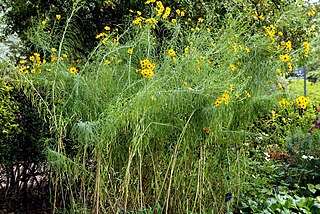
Helianthus salicifolius is a North American species of sunflower known by the common name willowleaf sunflower. It is native to the central United States, primarily in the Great Plains and Ozark Plateau. There are a few reports of scattered populations in the Northeast and Midwest parts of the country, but these appear to be escapes from cultivation.

